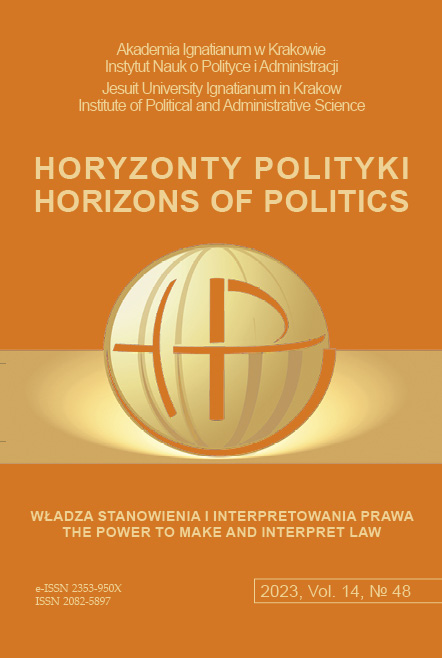Przekraczanie językowej granicy
władzy interpretowania prawa
Crossing the linguistic limit of the power to interpret the law
Author(s): Olgierd BoguckiSubject(s): Philosophy of Law, Politics and law, Philosophy of Law, Sociology of Law
Published by: Uniwersytet Ignatianum w Krakowie
Keywords: theory of law; interpretation of law; limits of legal interpretation;
Summary/Abstract: RESEARCH OBJECTIVE: The aim of the study is to analyze the approach to the linguistic limit of interpretation in the derivational theory of legal interpretation.THE RESEARCH PROBLEM AND SCIENTIFIC METHODS: It is extremely important to recognize the linguistic boundary of interpretation. The derivational theory offers such an approach. However, the question arises to what extent it is justified. The issue is considered using the method of analytical legal theory.THE PROCESS OF ARGUMENTATION: In the first part, the directives formulated in the derivational theory regarding the limitation of the possibility of crossing the language border are critically analysed. The theoretical and practical difficulties associated with them are indicated. The second part is devoted to indicating the direction of modification of these directives.RESEARCH RESULTS: As a result of the analysis, it is recognized that the current approach is theoretically controversial and leads to such a significant reduction in the possibility of rejecting the results of linguistic interpretation that it basically loses its practical significance. Therefore, the direction of the proposed modification of derivational model is outlined, which aims to make it more flexible and more applicable in the practice of interpretation. According to it, crossing the linguistic border depends on the proportion between the degree of axiological justification and the degree of change in the meaning of a linguistic expression.CONCLUSIONS, INNOVATIONS, AND RECOMENDATIONS: If derivational theory is to have the potential to develop a Polish integrated theory of legal interpretation on its basis, it seems that it should make the interpretation model more flexible and give up the “rigid”, formalistic restrictions of rejecting the linguistic meaning. Instead, the issue of the linguistic border should be considered as a problem of acceptable degree of modification of linguistic meaning when referring to axiological arguments.
Journal: Horyzonty Polityki
- Issue Year: 14/2023
- Issue No: 48
- Page Range: 79-96
- Page Count: 18
- Language: Polish

